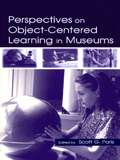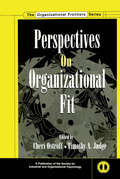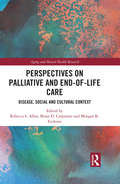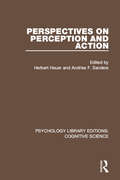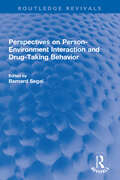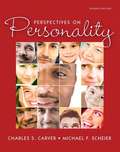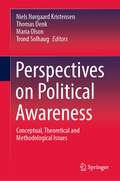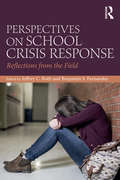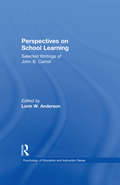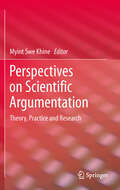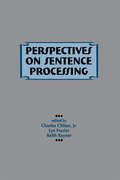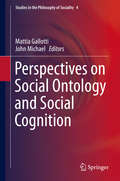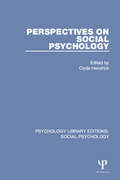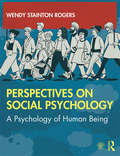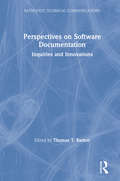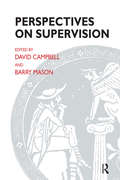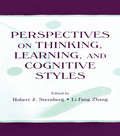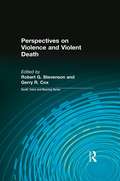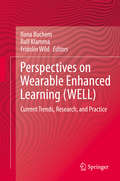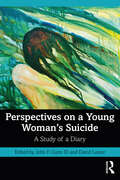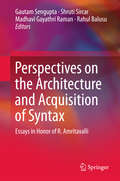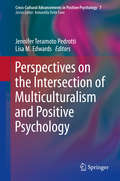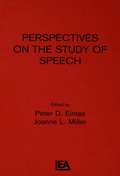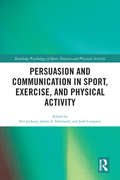- Table View
- List View
Perspectives on Object-Centered Learning in Museums
by Scott G. ParisOriginating in a recent NSF conference held at the University of Michigan, this book examines the latest ideas about how children interact with objects and through that interaction acquire new understandings, attitudes, and feelings. Although museum education provides the primary setting within which object-centered learning is explored, the analyses apply to a wide range of learning environments. Despite the demonstrated importance of object-centered learning for both academic and life-long learning, until now there has been little psychological research on the topic. Key features of this outstanding new book include: *Cross-disciplinary Focus--This is the first book to examine object-centered learning using the perspectives of such diverse fields as science, history, literacy, and art. *Museum Focus--The explosion of interest in museums of all kinds provides a natural launching pad for conceptual and practical discussions of object-based learning and informal learning environments. Vignettes--In order to ground the conceptual analyses, each chapter includes vignettes describing people actively engaged with objects in a specific setting. This volume is appropriate for advanced students and researchers in educational psychology, cognitive psychology, science education, and persons directly involved in museum education.
Perspectives on Organizational Fit (Siop Organizational Frontiers Ser.)
by Timothy A. Judge Cheri OstroffThis book concerns how employees consider their work lives, how well they fit their jobs, the work setting, other people, and what is important and valued in their organizations. Perspectives on Organizational Fit, a new book in SIOP's Organizational Frontiers Series, takes a scholarly look at fit in organizations: the relationship between individu
Perspectives on Palliative and End-of-Life Care: Disease, Social and Cultural Context (Aging and Mental Health Research)
by Rebecca S Allen Brian D Carpenter Morgan K. EichorstIndividuals and families face challenges at the end of life that can vary significantly depending on social and cultural contexts, yet more than ever is now known about the needs that cut across the great diversity of experiences in the face of dying and death. A number of behavioural interventions and clinical approaches to addressing these needs have been developed and are available to help providers care for clients and assist them in achieving their goals. Perspectives on Palliative and End-of-Life Care: Disease, Social and Cultural Contexts explores how these interventions can be used to address a range of issues across social and cultural contexts for those in need of end of life care. <P><P>With perspectives from experienced clinicians, providers, and caregivers from around the world, the book offers a strong foundation in contemporary evidence-based practice alongside seasoned practice insights from the field and explores interventions for people as diverse as HIV caregivers in Africa and individuals dying with dementia. In addition, readers will learn about the process of caring for individuals with chronic illnesses including severe mental illness; weigh the impact of policy regulations on the availability of and access to palliative care and interventions; and be able to compare the different issues experienced by family caregivers and formal caregivers. <P><P>As the companion volume to Perspectives on Behavioural Interventions in Palliative and End-of-Life Care, this book will be of interest to a wide variety of individuals, such as academics, researchers and postgraduates in the fields of mental health, medicine, psychology and social work. It will also be essential reading for healthcare providers and trainees from psychosocial and palliative medicine, social work and nursing.
Perspectives on Perception and Action (Psychology Library Editions: Cognitive Science)
by Andries F. Sanders Herbert HeuerOriginally published in 1987, this title aimed to present an eclectic and biased account of the status of perception-action relationships in various fields at the time. The chapters can be divided into three sections. The first focuses on motor control, a neglected topic in the past and hence deserving the role of the starting point of this volume. In addition motor control provides a good background to discuss the clear sensory and perceptual effects. However, motor processes are also highly relevant to perception, which was usually less emphasized in the literature at the time. Therefore a special section is devoted to motor processes in perception together with the issue of integrating information from different sources. The book concludes with a section on attention and selection of perceptual information for subsequent action.
Perspectives on Person-Environment Interaction and Drug-Taking Behavior (Routledge Revivals)
by Bernard SegalFirst published in 1987, Perspectives on Person-Environment Interaction and Drug-Taking Behavior provides a comprehensive overview of the interactionist approach from both a theoretical and applied perspective. Divided into five chapters, it deals with themes like psychosocial interactionism and substance use; social sanctions, self-referent responses, and the continuation of substance abuse; the interaction of child and environment in the early development of drug involvement; reconceptualization of person- environment interactions; and the disease theory of alcoholism from an interactionist perspective. This book is a must read for scholars and researchers of addiction studies, applied psychology and psychology in general.
Perspectives on Personality (7th Edition)
by Charles S. Carver Michael F. ScheierThis book describes a range of viewpoints that are used by personality psychologists today. Each perspective on personality is presented in a pair of chapters, introduced by a prologue that provides an overview of that perspective’s orienting assumptions and core themes. By starting with these orienting assumptions, you’ll be placed right inside the thought processes of the theorists, as you go on to read the chapters themselves. Each chapter concludes with a discussion of current problems within that theoretical viewpoint and the authors’ analysis about its future prospects. The result is a book that is engaging and enjoyable as well as informative. Learning Goals Upon completing this book, readers should be able to: Identify the ideas that form each theoretical viewpoint Understand the importance of research and why the role of research stresses the fact that personality psychology is a living, dynamic process of ongoing scientific exploration See how each perspective reflects fundamental assumptions about human nature and how behavior problems can arise and be treated from each perspective Understand how the different viewpoints relate to each other and the usefulness of blending theoretical viewpoints, treating theories as complementary, rather than competing.
Perspectives on Political Awareness: Conceptual, Theoretical and Methodological Issues
by Thomas Denk Maria Olson Niels Nørgaard Kristensen Trond SolhaugThis interdisciplinary volume presents a comprehensive framework to understand political awareness. Political awareness has become an important part of research on political attitudes and political behavior since the publication of John Zaller's work on political opinion. The authors elaborate on his theory and present a new conceptualization, which stipulates that political awareness is the attentiveness, knowledge, and understanding of politics. Hence, the book discusses different aspects, such as the concept of political awareness, its formation, significance, measurement, and exploration. The result is a new framework that addresses conceptual, theoretical, and methodological questions, such as: What does the concept mean? How to study political awareness? How is it connected to other orientations? How do children and youth develop political awareness? Addressing researchers and graduate students, as well as scholars in political science, sociology, and education, this book is a must-read for everybody interested in a better understanding of political awareness.
Perspectives on School Crisis Response: Reflections from the Field
by Jeffrey C. Roth Benjamin S. FernandezThis book offers a unique collection of narrative case studies that capture the responses of mental health professionals to tragedies in schools and are designed to connect key concepts and skills with real life application. By citing evidence-based theories and interventions with vivid real world accounts, this volume aims to highlight the multi-phased, multi-disciplinary nature of school crisis response while emphasizing the need for effective coordination and collaboration. It provides a powerful professional development resource for school crisis teams, psychologists, counselors, social workers, nurses, resource officers, administrators and teachers, and training university students, who will face similar situations.
Perspectives on School Learning: Selected Writings of John B. Carroll (Psychology of Education and Instruction Series)
by Lorin W. AndersonFirst Published in 1985. Routledge is an imprint of Taylor & Francis, an informa company.
Perspectives on Scientific Argumentation
by Myint Swe KhineArgumentation--arriving at conclusions on a topic through a process of logical reasoning that includes debate and persuasion-- has in recent years emerged as a central topic of discussion among science educators and researchers. There is now a firm and general belief that fostering argumentation in learning activities can develop students' critical thinking and reasoning skills, and that dialogic and collaborative inquiries are key precursors to an engagement in scientific argumentation. It is also reckoned that argumentation helps students assimilate knowledge and generate complex meaning. The consensus among educators is that involving students in scientific argumentation must play a critical role in the education process itself. Recent analysis of research trends in science education indicates that argumentation is now the most prevalent research topic in the literature. This book attempts to consolidate contemporary thinking and research on the role of scientific argumentation in education. Perspectives on Scientific Argumentation brings together prominent scholars in the field to share the sum of their knowledge about the place of scientific argumentation in teaching and learning. Chapters explore scientific argumentation as a means of addressing and solving problems in conceptual change, reasoning, knowledge-building and the promotion of scientific literacy. Others interrogate topics such as the importance of language, discursive practice, social interactions and culture in the classroom. The material in this book, which features intervention studies, discourse analyses, classroom-based experiments, anthropological observations, and design-based research, will inform theoretical frameworks and changing pedagogical practices as well as encourage new avenues of research.
Perspectives on Sentence Processing
by Keith Rayner Charles Clifton Lyn FrazierOne of the liveliest forums for sharing psychological, linguistic, philosophical, and computer science perspectives on psycholinguistics has been the annual meeting of the CUNY Sentence Processing Conference. Documenting the state of the art in several important approaches to sentence processing, this volume consists of selected papers that had been presented at the Sixth CUNY Conference. The editors not only present the main themes that ran through the conference but also honor the breadth of the presentations from disciplines including linguistics, experimental psychology, and computer science. The variety of sentence processing topics examined includes: * how evoked brain potentials reflect sentence comprehension * how auditory words are processed * how various sources of grammatical and nongrammatical information are coordinated and used * how sentence processing and language acquisition might be related. This distinctive volume not only presents the most exciting current work in sentence processing, but also places this research into the broader context of theorizing about it.
Perspectives on Social Ontology and Social Cognition
by John Michael Mattia GallottiPerspectives on Social Ontology and Social Cognition brings together contributions discussing issues arising from theoretical and empirical research on social ontology and social cognition. It is the first comprehensive interdisciplinary collection in this rapidly expanding area. The contributors draw upon their diverse backgrounds in philosophy, cognitive science, behavioral economics, sociology of science and anthropology. Based largely on contributions to the first Aarhus-Paris conference held at the University of Aarhus in June 2012, the book addresses such questions as: If the reference of concepts like money is fixed by collective acceptance, does it depend on mechanisms that are distinct from those which contribute to understanding the reference of concepts of other kinds of entity? What psychological and neural mechanisms, if any, are involved in the constitution, persistence and recognition of social facts? The editors' introduction considers strands of research that have gained increasing importance in explaining the cognitive foundations of acts of sociality, for example, the theory that humans are predisposed and motivated to engage in joint action with con-specifics thanks to mechanisms that enable them to share others' mental states. The book also presents a commentary written by John Searle for this volume and an interview in which the editors invite Searle to respond to the various questions raised in the introduction and by the other contributors.
Perspectives on Social Psychology (Psychology Library Editions: Social Psychology)
by Clyde HendrickOriginally published in 1977, this volume was intended to provide a relatively elementary and clear overview of some of the more important approaches to social psychology at the time. There are a number of perspectives on this discipline, but here, instead of traditional theoretical approaches (e.g. field theory, role theory or S-R) the point of view is from the general perspective. The first chapter approaches social psychology as an experimental science, with the history and philosophic traditions discussed, as well as the current state of the field. Other chapters approach the discipline from the perspectives of symbolic interaction, social development, and ethology. The final chapter is devoted to the uses of mathematical models in social psychology. <P><P> This volume was intended to serve as a helpful integration of the field, and will still be useful as a text in its historical context.
Perspectives on Social Psychology: A Psychology of Human Being
by Wendy Stainton RogersThis groundbreaking new textbook takes a different perspective on social psychology, focused on the social and cultural worlds we inhabit, and encompassing a wide range of core social psychology topics – from the self to relationships, gender to health, racism to mental distress. Taking a critical approach, this book explores how qualitative methods and interpretational analyses can be used to examine human behaviour and what it is like living in today’s media-led world. It explicitly challenges all forms of Othering, taking a fresh look at human values, embodiment, agency, communication, thinking and feeling. It goes beyond the individualising scientific approach taken by traditional psychology, instead concentrating on the psychology of what makes us human – qualities like empathy and compassion, courage and dignity, kindness and sympathy – and how we can nurture them. Offering a fascinating alternative to existing resources and enhanced by carefully chosen full-colour illustrations, the book and associated companion website include original pedagogical features such as reflective exercises, further resources and a glossary, offering opportunities for readers to customise their learning experience. Featuring a course mapping section that sets out how the text can be used in relation to psychology curriculum requirements and common course structures, this interdisciplinary resource provides accessible and engaging reading for students studying psychology and other disciplines, including sociology, cultural studies, politics and media studies, as well as applied areas such as nursing, policing and management. It is also for anyone who is interested in what psychology can tell us about our lives and place in the world.
Perspectives on Software Documentation: Inquiries and Innovations (Baywood's Technical Communications)
by Thomas T BarkerThis book is designed to address the randomness of the literature on software documentation. As anyone interested in software documentation is aware, the field is highly synthetic; information about software documentation may be found in engineering, computer science training, technical communication, management, education and so on. "Perspectives on Software Documentation" contains a variety of perspectives, all tied together by the shared need to make software products more usable.
Perspectives on Supervision (The Systemic Thinking and Practice Series)
by David Campbell Gill Gorell Barnes Barry MasonThis reader-friendly and stimulating volume, indispensable to anyone interested in supervision from a systemic perspective, emerged from a conference organised jointly by the Institute of Family Therapy and the Tavistock Clinic in London. It is focused on developments within supervisions and reflects the increasing need for clinical supervisors in advanced level family training courses. The central theme of the book is the application of systemic thinking to the field of supervision. The complexities of topics involved in this area are fully engaged by the many contributors. The book is organised into four main sections, each ending with a useful and unifying commentary from the editors.
Perspectives on Thinking, Learning, and Cognitive Styles (Educational Psychology Series)
by Robert Sternberg Li-Fang ZhangThis volume presents the most comprehensive, balanced, and up-to-date coverage of theory and research on cognitive, thinking, and learning styles, in a way that: * represents diverse theoretical perspectives; * includes solid empirical evidence testing the validity of these perspectives; and * shows the application of these perspectives to school situations, as well as situations involving other kinds of organizations. International representation is emphasized, with chapters from almost every major leader in the field of styles. Each chapter author has contributed serious theory and/or published empirical data--work that is primarily commercial or that implements the theories of others. The book's central premise is that cognitive, learning, and thinking styles are not abilities but rather preferences in the use of abilities. Traditionally, many psychologists and educators have believed that people's successes and failures are attributable mainly to individual differences in abilities. However, for the past few decades research on the roles of thinking, learning, and cognitive styles in performance within both academic and nonacademic settings has indicated that they account for individual differences in performance that go well beyond abilities. New theories better differentiate styles from abilities and make more contact with other psychological literatures; recent research, in many cases, is more careful and conclusive than are some of the older studies. Cognitive, learning, and thinking styles are of interest to educators because they predict academic performance in ways that go beyond abilities, and because taking styles into account can help teachers to improve both instruction and assessment and to show sensitivity to cultural and individual diversity among learners. They are also of interest in business, where instruments to assess styles are valuable in selecting and placing personnel. The state-of-the-art research and theory in this volume will be of particular interest to scholars and graduate students in cognitive and educational psychology, managers, and others concerned with intellectual styles as applied in educational, industrial, and corporate settings.
Perspectives on Transitions in Schooling and Instructional Practice
by Susan E. Elliott-Johns Daniel H. JarvisPerspectives on Transitions in Schooling and Instructional Practice examines student transitions between major levels of schooling, teacher transitions in instructional practice, and the intersection of these two significant themes in education research. Twenty-six leading international experts offer meaningful insights on current pedagogical practices, obstacles to effective transitions, and proven strategies for stakeholders involved in supporting students in transition.The book is divided into four sections, representing the four main transitions in formal schooling: Early Years (Home, Pre-school, and Kindergarten) to Early Elementary (Grades 1-3); Early Elementary to Late Elementary (Grades 4-8); Late Elementary to Secondary (Grades 9-12); and Secondary to Post-Secondary (College and University). A coda draws together over-arching themes from throughout the text to provide recommendations and a visual model that captures their interactions.Combining theoretical approaches with practical examples of school-based initiatives, this book will appeal to those involved in supporting either the student experience (both academically and emotionally) or teacher professional learning and growth.
Perspectives on Violence and Violent Death (Death, Value and Meaning Series)
by Robert G Stevenson Gerry R CoxThis book examines violence. It looks at the nature and types of violence, the causes of violence, and the emotional wake left by violent episodes. In the twentieth century, the world experienced two world wars and countless other wars. Many millions died violent deaths from murder, death squads, purges, riots, revolutions, ethnic cleansing, rape, robbery, domestic violence, suicide, gang violence, terrorist acts, genocide, and in many other ways. As we entered the twenty-first century, we experienced 9/11, the Red Lake School deaths, suicide bombers, and more mass death brought about by the actions of governments, revolutionaries, terrorists, and still more wars. The need to better understand violence, both lethal and non-lethal, to become aware of the many forms of violence, and to learn how to survive in the aftermath of violent death are the focus of "Perspectives on Violence and Violent Death."
Perspectives on Wearable Enhanced Learning (WELL): Current Trends, Research, and Practice
by Fridolin Wild Ralf Klamma Ilona BuchemWearable technologies – such as smart glasses, smart watches, smart objects, or smart garments – are potential game-changers, breaking ground and offering new opportunities for learning. These devices are body-worn, equipped with sensors, and integrate ergonomically into everyday activities. With wearable technologies forging new human-computer relations, it is essential to look beyond the current perspective of how technologies may be used to enhance learning. This edited volume,“Perspectives on Wearable Enhanced Learning,” aims to take a multidisciplinary view on wearable enhanced learning and provide a comprehensive overview of current trends, research, and practice in diverse learning contexts including school and work-based learning, higher education, professional development, vocational training, health and healthy aging programs, smart and open learning, and work. This volume features current state of the art wearable enhanced learning and explores how these technologies have begun to mark the transition from the desktop through the mobile to the age of wearable, ubiquitous technology-enhanced learning.
Perspectives on a Young Woman's Suicide: A Study of a Diary
by David Lester John F. GunnPerspectives on a Young Woman's Suicide is a unique and updated analysis of a diary left behind by "Katie," a young woman who took her own life. By drawing on clinicians, researchers, survivors of suicide loss, and those closest to Katie, this book delves into common beliefs about why people die by suicide and into the internal worlds of those who do, as well as ethical and moral questions surrounding those deaths. Several contributors discuss Katie’s suicide from the perspective of recent theories of suicide, including Joiner’s interpersonal theory and Klonsky’s three-step theory. Two contributors who have lost a child to suicide look at Katie’s diary from their perspective, one of whom discusses whether it is truly possible to prevent suicide. Finally, Katie’s sister reveals her reactions to this project and her ex-boyfriend shares his account of her death. This book is a vital addition to the library of any researcher, academic, or professional interested in suicide and suicide prevention.
Perspectives on the Architecture and Acquisition of Syntax: Essays In Honour Of R. Amritavalli
by Gautam Sengupta Shruti Sircar Madhavi Gayathri Raman Rahul BalusuThis festschrift volume brings together important contributions by expert syntacticians across the globe on tense and finiteness, adjectives, dative and ergative case, acquisition of case, and other topics both within the domain of Dravidian linguistics and in the broader theoretical understanding of cross-linguistic data. Professor R. Amritavalli, a renowned linguist, has spent over three decades in the fields of syntax and syntactic acquisition, making important and landmark contributions in these areas, and this book is a recognition of her work. The contributors cover these themes in the context of English, Chinese, Japanese, Korean, Hindi-Urdu, Bangla, Dravidian languages, and understudied languages like Huave. The analyses presented here have major implications for current theories of syntax and semantics, first and second language acquisition, language typology and historical linguistics, and will be a valuable resource for students, researchers and teachers.
Perspectives on the Intersection of Multiculturalism and Positive Psychology
by Lisa M. Edwards Jennifer Teramoto PedrottiThe volume will be a collection of chapters about current theory, research, and practice related to multiculturalism and positive psychology. This book will serve as a reference to any who are interested in the intersection of positive psychology and multicultural context. While many in the field of positive psychology have begun to move more strongly towards a culturally-embedded approach that recognizes the importance of context in discussing, viewing and cultivating strengths in individuals from different backgrounds, there is still a dearth of research in this area compared with studies that take a cross-cultural approach (comparing people from different countries) or one that is purported to be "culture-free" or universal in its application. While it is becoming more common to see various articles or chapters published on these topics, there is still no comprehensive text aimed at discussion of the collection of these topics presented in a cohesive and structured way. This book aims to fill this gap in the literature. In this book, a broad definition of culture is utilized that includes such facets as race, ethnicity, socioeconomic or social class status, disability, religion, sexual orientation and gender. This book is intended to present research, theory and suggestions for practice that are grounded in diverse cultural contexts and current scholarship. It will assist researchers, students and practitioners who are studying and working within diverse populations. Currently there exists no comprehensive text that addresses the intersection of positive psychology and multiculturalism. Several edited volumes address positive psychology constructs (e. g. , well-being, optimal experience, autonomy) across cultures, but they do not focus on multicultural populations within the United States. Other books focus more specifically on mental health applications and stress and coping among multicultural populations, however these books do not provide a broad perspective on psychology beyond this application piece. The proposed book will review current theory and research about constructs in addition to applications across contexts. Finally, other published books have focused on youth within multicultural society; this volume is more broad in its address of issues of positive psychology across the lifespan and across various aspects of identity including disability, gender, social class and sexual orientation.
Perspectives on the Study of Speech
by Peter D. Eimas, Joanne L. MillerPublished in the year 1982, Perspectives on the Study of Speech is a valuable contribution to the field of Cognitive Psychology.
Persuasion and Communication in Sport, Exercise, and Physical Activity (Routledge Psychology of Sport, Exercise and Physical Activity)
by Edited by Ben Jackson, James A. Dimmock, and Josh ComptonHow can we use persuasion methods to make people more physically active and improve their sport and exercise experiences? How can instructors, coaches, athletes, and practitioners most effectively communicate their messages to others? Persuasion and Communication in Sport, Exercise, and Physical Activity is the first book to consider the applications of persuasion frameworks within activity-related contexts, while also summarizing the major developments relating to communication topics in these settings. It provides a state of the art review of the key developments, challenges, and opportunities within the field. It brings together international experts from the fields of social, health, and sport and exercise psychology, to give theoretical overviews, insights into contemporary research themes and practical implications, as well as agendas for future research. Covering topics such as changing attitudes towards exercise, social influence, persuasive leadership and communicating with people with physical disabilities, this book provides a contemporary approach to persuasion and communication in a sport, exercise and physical activity setting. It is an important text for upper-level undergraduate and postgraduate students, as well as academics in the fields of Sport and Exercise Science, Kinesiology, Health and Physical Activity Promotion, and related areas of Psychology.
